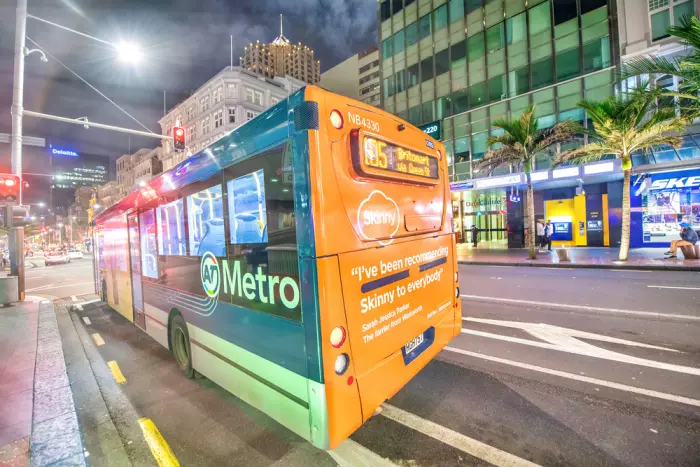Summary: The bus operator once owned by Infratil and the subject of council and union complaints, NZ Bus, has been put up for sale by its Australian private equity owners just two years after Infratil offloaded it. Elsewhere, global stocks rebounded overnight on better omicron news and bargain hunting by those unfazed by the Fed’s abandonment of ‘Team Transitory’ on inflation and a likely speeding up of monetary stimulus withdrawal.
NZ Bus back on the block Months after settling an extended industrial dispute with drivers in Wellington and being rebuked by its council clients, NZ Bus is being put up for sale again by its Australian private equity owners. Next Capital has hired UBS to test buyer appetite for NZ Bus, the Australian Financial Review reported this morning. NZ Bus has over 700 buses running routes on behalf of councils in Auckland, Wellington and Tauranga. Next only bought NZ Bus from Infratil in Sept 2019 for A$230m.
‘The times they are a changin’ NZ Bus’ contracts face substantial reengineering in coming years if the government's review of the Public Transport Operating Model decides to bring bus services back in house with councils, as already signalled by government and councils. Potential buyers include KKR, which paid NZ$500m for Ritchies Transport in August, and Kinetic, a private equity firm owned by Canada’s OPTrust and Australia’s Infrastructure Capital Group, the AFR reported. Infrastructure Capital Group is buying Meridian’s Australian assets with Shell.
They bought the dip Global stocks bounced back this morning as investors jumped in to buy what they saw as bargains after yesterday morning’s rout. Markets digested the Fed’s abandonment of ‘Team Transitory’ and focused instead on snippets of good news emanating from South Africa on the potency of the omicron strain. The S&P 500 was up about 0.5% at 7.30 am NZT, while the US 10 year Treasury yield was flat at 1.45%. The NZ dollar was off its overnight highs of 68.6 US cents at around 68.2 Usc this morning.
Europe’s bigger bounce British and German stocks rebounded twice as much overnight as they had fallen a day earlier, in part on reassurances from the European Central Bank that it still saw inflation as transitory and would keep printing and bond-buying at a rate of €80b a month. The German 10-year bund was solid at -0.35%, meaning the real yield is running at around -6.3% because of 6.0% inflation in Germany.
Turkish intervention Turkey’s central bank intervened overnight to buy the Turkish lira, breaking a previous promise not to buy the local currency, which has collapsed 47% this year because of interest rate cuts global investors see as politically driven. The lira bounced 8% after President Tayyip Erdogan said the central bank had intervened “due to unhealthy price formations in exchange rates.” One NZ dollar buys 9.04 lira this morning, up from 5.86 as recently as August 21 at the start of our lockdown. (Bloomberg)
Higher inflation forecast The OECD forecast global GDP growth of 5.6% this year before a moderation to 4.5% in 2022 and 3.2% in 2023. The growth forecast was little changed from the OECD’s last outlook, but it raised its global inflation forecast for next year to 4.4% from 3.9%.
‘But hold your nerve’ However, OECD chief economist Laurence Boone said central bankers should hold their rate hikes to wait for inflation to ease. “In current circumstances, the best thing central banks can do is to wait for supply tensions to diminish and signal they will act if necessary,” Boone said overnight.
Mild cases South African authorities reported overnight initial signs were the omicron variant was more infectious, but that cases were mild, although hospitalisations had increased.
‘Mandate it’ Elsewhere in covid news, the European Union called on its members to consider copying Austria’s decision to make vaccination compulsory for all eligible citizens. "It is understandable and appropriate to lead this discussion now – how we can encourage and potentially think about mandatory vaccination within the European Union,” European Commission President Ursula von der Leyen said overnight. (Euronews)
Fresh on BusinessDesk this morning
Peter Griffin reflects in his weekly column on the death of Jake Millar, the role of the business media sometimes accused of cutting down tall poppies, and the mental health risks for entrepreneurs and company founders.
Jenny Ruth takes a closer look at why businesses are saying credit availability from banks is at record lows, while banks themselves say there is a lack of demand from businesses.
Henry Burrell reports New Zealand’s vaccine passes run on an IT system that stores personal data overseas, a move a Māori data sovereignty expert says is adding to mistrust of government.
ICYMI yesterday
- The government announced a $37.5m plan to give 100,000 vouchers to Auckland families to visit various attractions and venues such as the zoo and Motat.
- Mayor Phil Goff proposed Auckland council’s annual budget for 2022/23 includes $1b of spending on climate change initiatives over 10 years, funded by a 2.5% climate action targeted rate on top of 3.5% regular rate increase.
- Winton Property decided to go ahead with a $350m capital raising through a dual listing on the NZX and ASX (BusinessDesk).
- The NZX closed flat after shares in Synlait surged on solid profit guidance, offsetting weaker stocks elsewhere (BusinessDesk).






